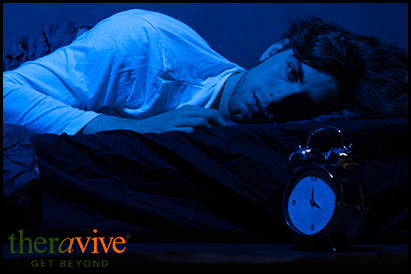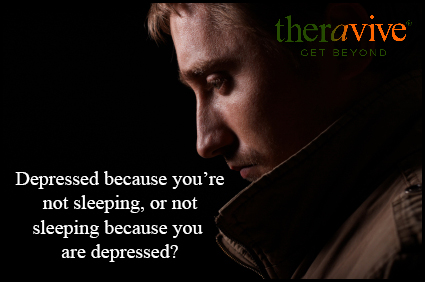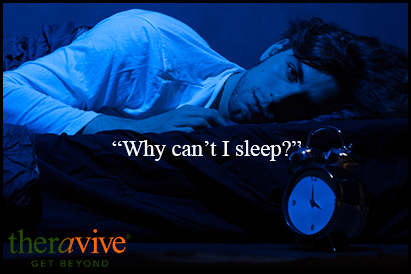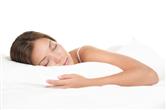December 11, 2014
by Marti Wormuth, MA

Sleep. Sleep is something that many of us admit that we want to get more of, but most of us don't. As I write this, I've been struggling with my sleep patterns for a couple of weeks at this point. We all go through times like that, but did you know that, if you are not getting enough sleep, you can actually be negatively affecting your mental health? It's true. Getting good sleep and feeling well rested is absolutely vital when it comes to taking care of our mental health. Why? We're going to take a closer look at that and how you can be sure to get better sleep.
[More]
November 28, 2014
by David Porter, MA

Sleep is a basic requirement for survival, as essential as air, food, and water. It is a period of time where the activity of our body and brain are on standby, so both can not only reduce the amount of energy used, but recharge vital functions. It is something we must all do about every 16 hours.
[More]
August 14, 2014
by Cathy England, MA

Sleep disturbances are common in the United States population. Harvard Health Publications (2009), estimate that sleep problems are prevalent in at least 50% of patients receiving psychiatric treatment. This can be compared to the general population in which about 10% report sleep problems. What is not entirely clear is whether or not sleep disturbance is a symptom or a risk factor for mental health presentations.
[More]
August 9, 2014
by Marti Wormuth, MA

Sleep is one of the most important things that we have to do, because our body does a number of important functions during sleep. It recuperates from injury, helps the body to rest, metabolizes food and such from throughout the day, and more. Because of this, it's important that we get a sufficient amount of sleep on a regular basis. But some of us have some major issues with sleeping, and because of this, we don't exactly know how to take care of it.
[More]
Mental Illness, Cognitive Decline, or Sleep Deprivation? How to tell the difference, and why it is important.
[More]
September 5, 2013
by Ashley Marie

It’s 11pm. Now 12am. Now 1am. Now 2am. Now 3am.
And you still haven’t fallen asleep.
During those sleepless hours, you might feel like the whole world is asleep – except you. But you are not alone.
In 2010, it was reported that the demand for sleeping pill prescriptions boosted by 60% in the United States.[1] Moreover, one in three Americans has difficulties falling asleep, and more than 35 million have chronic insomnia.
A Brief History of Insomnia
There is an intriguing relationship between insomnia and historical developments. As outlined by Summers-Bremner, certain events of the human story have contributed to our propensity to become insomniacs.[2] In the 1700s, the European Baroque culture led to a greater appreciation of modern nightlife, thereby interrupting regular sleep patterns. Historians especially point to industrialization as a dominant variable that led groups of society – even cities – to become victims of tiresome, sleepless nights. The developments of gas, electric lighting, the increasing popularity of nighttime entertainment, and evermore-busy schedules have turned our sleep into an utter nightmare. For these reasons, urban cities are especially connected with the rise of insomnia. It is not surprising, then, that the popular Hollywood film, Sleepless in Seattle, takes place in an urban setting.
My Experience with Insomnia
Like you, I too have suffered from insomnia. I am all too familiar with the cycle of fearing that I will not fall asleep, not falling asleep, and then dreading that I will wake without ever having slept.
I have laid down in bed and calculated how many coffees or teas I should have the next day,just to get through the first few hours of the morning. I have also planned out when I can squeeze in a quick 15-minute nap to give me the energy needed to last the rest of the day. And I have felt hopeless by thinking that my insomnia had no cure.
But following the advice of my counselor, I made a few small changes in my diet, exercise, schedule, and thought patterns. I eventually discovered that I could enjoy the blessing of a restful sleep.
Defining Insomnia
Doctors have defined three main types of insomnia.[3]
Transient Insomnia
The first of these is transient insomnia. This category of insomnia involves troubles sleeping for only a night or two. For example, you might not sleep as well on the night before an exam, or the night before an important meeting, or the night after a heated argument with your loved one.
Short-Term Insomnia
Secondly, short-term insomnia occurs when you cannot sleep well for a few days or even a few weeks. This could be because you are stressed about work, suffering from relationship issues, or getting over jet lag.
Chronic (or Acute) Insomnia
Thirdly, chronic insomnia involves troubled sleep patterns that last for months or years. Unfortunately, this category of insomnia can lead to or be caused by mental health issues, notably depression and anxiety.
Insomnia and Mental Health Issues
Depression
One of the key mental health issues associated with insomnia is depression.[4] Signs of depression include irritability, a short temper, decreased motivation, an inability to concentrate, hopelessness, increased crying, and a lack of fulfillment in things that you would typically enjoy.
Sometimes it is difficult to trace the causal relationship between insomnia and depression. Did your insomnia cause your depression or did your depression cause your insomnia? If you are unsure of the answer, it is a good idea to discuss this with a counselor. Addressing this question can help you identify the root of your insomnia, which can help you along the path to more restful nights.
Anxiety
In addition to depression, anxiety can also be intimately related to insomnia.[5] Signs of anxiety include an inability to relax, dizziness, nausea, excessive fears, nightmares, and hot or cold sweats.
Anxiety can also lead to a perpetual cycle of feeling anxious about not sleeping and then not sleeping due to your anxiety.
If you struggle with anxiety and insomnia, then cognitive behavioral therapy is a helpful method of treatment. By seeking the help of a mental health professional, you can help identify the root of your anxiety, as well as effective coping techniques.
Seeking Help from a Mental Health Professional
Insomnia can be a lonely experience, but there are mental health professionals who can walk alongside you in your search for a restful sleep.
You know that simply counting sheep does not solve the issue. You also might feel that your insomnia is related to a deeper issue – the most common being either depression or anxiety. If you can’t sleep, then rest assured that there are counselors and therapists who can help you discover techniques, medications, and lifestyle changes that can help you restore your sleep. I’ll let you sleep on that.
[1] Kornblatt, S. 2010. Restful Insomnia. San Francisco: Red Wheel.
[2] Summers-Bremner, E. 2008. Insomnia: A Cultural History. London: Reaktion Books.
[3] Kornblatt, S. 2010. Restful Insomnia. San Francisco: Red Wheel.
[4] Silberman, S.A. 2008. The Insomnia Workbook. Oakland, CA: New Harbinger Publications.
[5] Ibid.
August 23, 2013
by Cindy Marie Hosszu

Why Do I feel so tired?
It is finally Friday! We are energized and eager to get that inbox emptied just in time for the weekend. Until that three o’clock crash hits us like a heat wave in the desert. Why is it that most people get so sleepy between two and four o’clock each day? We eat right, we love our jobs, and we want to be attentive and aware until that clock strikes five, but it happens anyway. It is hard to think, hard to stay focused, and hard to even keep our eyes open.
It has to do with our biological clock, or circadian cycle. The cycle dictates how alert we are during a twenty-four hour cycle. There are two times during that twenty-four hour cycle when our alertness will drop. Aside from some degree of difference due to life getting us off track, most of us will have these drops between two and four in the morning and again twelve hours later, which is our three o’clock slump. [1] What happens during these times is that the amount of natural light decreases, our body temperature decreases, we have a rise in a hormone that causes sleep called melatonin, and oxygen circulation in our body decreases. Our bodies really do want us to nap. Unfortunately, most of us who work need our job to survive, and most companies frown on crawling under the desk for a siesta.
While we can’t change nature, or the fact that our culture exists due to those of us working during this time to keep it running, we can do a few things to help make it through this mental dip in our day.
Get Your Sleep
If you can take a 20 minute nap, it can improve your focus, but the way to combat the afternoon crash is to get plenty of sleep each night. The afternoon slump is not as intense if you have had a good night’s sleep. In the summer, it is difficult to get the amount of sleep we need because the sun is up, and we have so many fun things to do, but our bodies take cues from the sun. Don’t let yourself stay up late because you have things to get done after the sun goes down. Sleep with the curtain open so that the sun wakes you, and then let yourself wind down in the evenings as the sun goes down. Avoid doing stimulating things, such as watching TV or being on the computer at night. Reading is a good way to wind down, and get your mind ready for sleep.
Friday Afternoon Dance Party
Combine the three things that stimulate your mind and body the most. Music helps to improve mood, and focus, movement helps alleviate your body temperature and increase adrenalin and oxygen circulation to the brain. If dancing around the office is too much for your company, a few stretches, getting up and walking around, or putting on the headphones, and having your own dance party are all adequate substitutes. I have found that having a standing desk has reduced my afternoon slump tremendously.
Get Some Rays
Take advantage of the natural light that helps regulate our circadian cycle by getting out in the sun for a few minutes. Going for a walk would combine that light with the movement that helps to wake us up.
Plan Group Activities
If you can, plan any group activities for that time when we are all getting drowsy. One of the things that enhance that sleepy feeling is boredom. [2] If you have activities that involve stimulating conversations or interesting ideas, plan them in the afternoon, when you will need that stimulation the most. On the other hand, if you know a meeting is going to be monotonous, plan it away from the afternoon mental crash.
The afternoon slump can be much worse on Friday when we are so close to the weekend, and wrapping up the week’s loose ends, but there is hope for those of us who suffer from the mind numbing body clock blues. It just takes knowing how your body works, getting plenty of sleep, light, and movement to keep us as energized and eager from morning until that clock strikes five.
Getting Help
The inability to concentrate at work could be more that just the time of day. If you are finding it generally hard to get up in the morning or maybe even hard to actually turn your mind off and get to sleep at night you may benefit from discussing things with a counselor. Many people are going through stressful events, or even work itself is stressful. The ability to talk-it-out and feel supported can help to bring back joy into the day and allow for more cohesiveness work environment.
[1] "How Your Body Clock Affects Sleep—And How to Reset It." Helpguide.org. Collaboration with Harvard Medical Publications, n.d. Web. 21 July 2013.
[2] “Boredom effects on sleepiness/alertness in the early afternoon vs. early evening and interactions with warm ambient temperature.” Mavjee, V., Home, J.A. British Journal of Psychology, (1994). 85(3), 317-333.
August 5, 2013
by Cindy Marie Hosszu

We are wired...
These days, we don’t often find ourselves running from mountain lions on our way to hunt for dinner, but our bodies are still wired to protect us from threats. Some more common threats we face in our time is mounting bills, busy jobs, raising teenagers, or… the amount of caffeine we put in our body. Caffeine increases cortisol levels in the body at rest, and exaggerates stress. [1] Cortisol is a stress hormone that functions to manage blood pressure, control blood sugar, and immune response. Cortisol is released in response to fear or stress by the adrenal glands, and is what we know as the fight or flight response. The same fight or flight response that was released when faced with a predator before computers, and other machines or gadgets existed to bring us a new kind of stress in our lives.
While we may not think of them as a threat, our bodies deal with stress the same way it would deal with the threat of running from mountain lions. When faced with a perceived threat, the hypothalamus, in the brain, initiates a process in which the body releases signals that alert your adrenal glands to release a surge of hormones. One of the hormones is adrenaline which increases your heart rate, blood pressure, and energy. Another hormone is Cortisol, which increases glucose in the bloodstream to trigger your brain to use glucose efficiently, and repair tissues. Cortisol also represses the immune system, digestive system and reproductive system, as well as the growth process. This process also controls mood, motivation, and fear.[2] After the threat has been removed, the hormones naturally flow back to a normal state of balance.
That cup of coffee in the morning gives us that boost of cortisol that we need to feel energy, and get our body moving. When we feel the crash that comes after, we often follow up with another cup of coffee, raising our cortisol again. We think it ends there, but research has found that the effects don’t just last for the day; they also last into the evening. [3] If this is a daily ritual for us, we may be putting ourselves at risk of adrenal stress. What happens in the body when the fight or flight response is activated without the action of fight or flight, is that the level does not flow back to natural state of balance properly. That constant flow of cortisol will increase the stress and eventually make it harder to manage stress.
Symptoms of Stress
Symptoms of adrenal stress will not show up overnight, but will happen slowly and gradually. Some of the symptoms are fatigue, depression, trouble sleeping, dizziness, muscle weakness and back pain, recurring infections, headaches, inflammation, salt craving, memory problems, hyperpigmentation, and excessive thirst.[4]
The Effects of Stress
Elevated cortisol levels can cause weight gain, increase in cholesterol, heart disease, and can lower bone density, as well as immune functions. It can also interfere with learning and memory. Long term increases in cortisol can cause damage to the brain and impair mental function. It is associated with cell death, which is associated with increased depression, mood, and nervous system disorders. If cortisol levels fluctuation too often, it can cause depression and mental illness. The executive function which is responsible for decision-making, planning, and reasoning are compromised.
Tips for Stress
Because caffeine exaggerates stress, it is best to not use any amount of caffeine during times of high stress such as physical exertion, emotional stress, grieving or illness.
To initiate the final step in the response get aerobic exercise regularly for about 30 minutes. You can do something that lets your aggression out, such as punching bag, or kick boxing.
Reduce anxiety by using meditation, or other relaxation techniques:
Get plenty of sleep.
Laughter and music helps reduce anxiety.
Have healthy relationships.
Seek professional counseling when needed.
[1] William R. Lovallo, Noha H. Farag, Andrea S. Vincent, Terrie L. Thomas, Michael F. Wilson, Cortisol responses to mental stress, exercise, and meals following caffeine intake in men and women, Pharmacology Biochemistry and Behavior, Volume 83, Issue 3, March 2006, Pages 441-447, ISSN 0091-3057
[2] "Chronic stress puts your health at risk - MayoClinic.com." Mayo Clinic. N.p., n.d. Web. 27 July 2013.
[3] "Caffeine Affects Cardiovascular and Neuroendocrine Activation at Work and Home." Psychosomatic Medicine. Journal of Behavioral Medicine, n.d. Web. 25 July 2013.
[4] Wilson, James L. Adrenal Fatigue: The 21st Century Stress Syndrome. Petaluma, CA: Smart Publications, 2001. 27-45. Print.
February 7, 2012
by Christie Hunter

By Tanya Glover
Theravive.com Contributor
Whether you realize it or not, sleep plays a very large role in our lives. In fact, at least 1/3 of our entire life is spent sleeping! When we are children we hate to do it and as adults we cannot get enough of it, but either way you look at it, sleep is something we must have. You may be surprised to learn what sleep does for our bodies and what the effects of not getting enough it can be.
The Importance of Sleep for Children
Children burn a lot of energy during the daytime hours. Their only real resting period (and yours!) is during slumber. It is recommended that school aged children should get between 10 and 12 hours of sleep each night to get the maximum benefits that sleep provides. But why is it so important to get enough sleep? What does it do?
· When you child is young, their brains are in developmental overload. Sleep helps to restore the brains functions in order for your child to be able to learn each day. It also gives their brains a rest from the flurry of activity it processes throughout the daytime hours.
· When a child does not get enough sleep it can lead to obesity. Sleep helps to keep hormones balanced and when you are not getting enough, these hormones have a harder time balancing out and in turn they do not properly regulate feelings of hunger. This can lead to overeating which is a major childhood issue right now.
· Lack of sleep in childhood has also been associated with ADHD and behavioral problems. When a child’s brain is not well rested they tend to act ways they are not even consciously aware of.
· For a child that stays overly tired, snoring can occur, even at very young ages. When infants snore it can delay their overall development.
· If your child experiences night terrors, you may want to evaluate the amount of sleep they are getting. Night terrors are made worse when a child is deprived of the proper amount of sleep.
· Lack of sleep can cause memory problems. This is because memory consolidation happens when you are asleep. When we do not get enough sleep this consolidation cannot occur and this can lead to short and long term memory loss.
· During the REM period of sleep, your child unlearns certain things. This is very important! Think of it like this. Your child has just learned how to ride a bike. The first 20 times that they tired, they fell off. However, the 21st time they mastered it! When they sleep they dump out the superfluous memories and keep the important learned lessons. This means that when the go to get on their bike they automatically do what they did on the 21st time, having unlearned how to fall off the bike! Sleep deprivation can make it to where these types of things are not unlearned and new skills may begin to slip away, only to have to be relearned all over again.
· Children who get enough sleep tend to perform better in all areas of their lives. Plus, having a child who gets enough sleep also gives you the chance to get the amount of sleep you need! It is a win-win situation!
The Importance of Sleep in Adults
Sleep is not just important for children. As adults, we still need enough sleep to function right and stay healthy. It is recommended that adults get at least 8 hours of sleep per night. Below you will find the top reasons why sleep plays an important part in our lives as well!
Becoming sleep deprived can be very dangerous. It effects hand-eye coordination which is needed to do many tasks each day. Take driving for example. This requires good reaction time and attention span. When someone who has not had enough sleep gets behind the wheel it is as bad as if they are intoxicated. And speaking of intoxication, those who are not getting enough sleep and who drink get affected more quickly by the alcohol which can make for some dangerous situations.
As we get older our memory begins to falter a bit. This is a natural part of aging but it is magnified 100% when you do not sleep enough.
Adults who do not get enough sleep are moodier during the day and have a hard time concentrating at the tasks the need to accomplish. This can lead to damage of relationship and job loss.
Studies have shown that adults who do not get the proper amount of sleep have a lower immune system. This is because the body is not being given enough time to rest and restore itself before being slung back into motion.
Studies have also shown that adults who do not sleep enough are more likely to have irregular heartbeats, high blood pressure and increased levels of stress.
Finally and maybe most importantly, getting enough sleep at night has been tied to helping people avoid cancer or fighting it off if it has already been diagnosed. Of course getting your rest will not cure cancer or stop it if it is going to infect you, but every little thing helps when it comes to this horrible illness so why not at least take it into consideration and get more sleep just in case?
Go to Bed! Why? Because I Said So!
No matter how young or old you are, it is a proven fact that your overall wellbeing and health is effected by how much sleep you get at night. Millions of people suffer from sleep deprivation. Some people do not get enough sleep because of stress in their lives or other things that keep them awake and worrying. For some it is due to insomnia, which is a curable disorder. Others just shirk sleep because they have so much to do (like me for instance!) No matter what the reason, the bottom line is that sleep is essential for keeping us happy and healthy. So, even though it may be difficult to get into the habit of going to bed earlier, it is something that your body will thank you for in a million and one ways! Now it is time for me to get some rest, so good night everyone!
October 25, 2010
by Christie Hunter

A good laugh and a long sleep are the best cures in the doctor's book.
~Irish Proverb
How true! If we all practiced these two “cures”, we would likely improve our health and decrease our stress! In today’s day and age, too many people are not getting either of these important cures! Both are relatively easy to incorporate in to your day without needing to make any major lifestyle changes. Let’s take a more detailed look at each of these.
Most Americans complain that they do not get enough sleep. Billions of dollars are spent each year on lost productivity and treatment for sleep-related problems. The recent research on sleep indicates that if you are not getting enough sleep, which for most people is 7 – 9 hours per night, you are at higher risk for high blood pressure, stroke, heart disease, mental impairment, depression and weight gain. When you are well rested the following results: you are more productive at home and work, you enjoy life more, you are more relaxed in your relationships and you are healthier. If you are not getting enough sleep, what would need to change in order for you to get more sleep? Many of us complain that we do not have time to sleep; but then, do you have the time or money to take care of any of the health issues listed earlier?? Is everything on our “to do” list really that important?
Now let’s look at the second “cure” - laughter. Have you ever counted how many times you truly laugh in a day’s time? Laughter increases the level of endorphins and neurotransmitters in your system and reduces the level of stress hormones. Laughing can improve your immune system and provide a wonderful physical and emotional release. All that from simply laughing! Think of ways to increase the laughter in your day - gravitate towards those people who are upbeat and have a good sense of humor, read those email jokes that make you laugh, work towards seeing the humor in even the most difficult situations, watch a funny movie….be creative with how you increase your comic relief.
What steps will you make to incorporate these 2 easy “cures” in to your day? The effort you put in to making these changes will more than repay you. It is a good investment in you, your family, and your business or career - and one that costs you nothing.
References: Say Goodnight to Insomnia, Gregg Jacobs, MD; www.sleepdex.org; www.about.com.
Leslie J. Hoy, MA, LPC is a Certified Cognitive Behavioral Therapist specializing in Depression, Anxiety, Sleep management, Couples Communication, Work-Life balance and Weight loss. She can be contacted at 210.379.4403 or leslie@hiperformance.net; www.leslie-lpc.com.